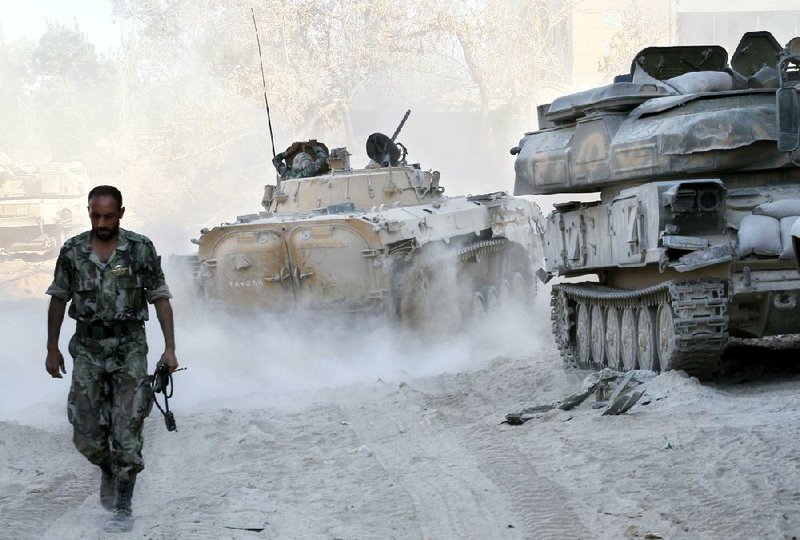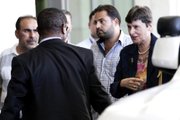DAMASCUS, Syria - The Syrian government accused rebels of using chemical weapons Saturday and warned the United States not to launch any military action against Damascus over a purported chemical attack last week, saying such a move would set the Middle East ablaze.
The accusations by the regime of President Bashar Assad against opposition forces came as an international aid group said it has tallied 355 deaths from a purported chemical-weapons attack Wednesday in a suburb of the Syrian capital known as Ghouta.
Syria is intertwined in alliances with Iran, Lebanese Hezbollah guerrillas and Palestinian militant groups. The country also borders its longtime foe and U.S. ally Israel, making the fallout from military action unpredictable.
Violence in Syria already has spilled over the past year to Lebanon, Turkey, Iraq and the Israeli-occupied Golan Heights. Battle-hardened Hezbollah fighters have joined the combat alongside Assad’s forces.
Meanwhile, U.S. naval units are moving closer to Syria as President Barack Obama considers a military response to the purported use of chemical weapons by Assad’s government.
Obama emphasized that a quick intervention in the Syrian civil war was problematic, given the international considerations that should precede a military strike.
After Obama met with his national-security team Saturday, the White House said U.S. intelligence officials are still trying to determine whether Assad’s government unleashed the chemical weapons attack last week.
The White House statement said Obama received a detailed review of the range of options he has requested for the U.S. and the international community to respond if it is determined that Assad has engaged in deadly chemical warfare.
Obama discussed the situation in Syria by telephone with British Prime Minister David Cameron, the White House said, adding that the two leaders expressed “grave concern” about the reported chemical-weapons use.
Defense Secretary Chuck Hagel indicated that U.S. military forces are positioned in the Mediterranean and ready to act if Obama orders a strike on Syria.
“The Defense Department has a responsibility to provide the president with options for all contingencies,” Hagel told reporters while en route to Kuala Lumpur, the beginning of a week-long visit to the region. “That requires positioning our forces, positioning our assets to be able to carry out different options, whatever option the president may choose.”
Preparations include the repositioning of personnel and assets, including ships, to be ready if the president chooses a military intervention, a senior U.S. defense official told reporters, speaking on condition of anonymity to discuss internal planning.
The U.S. now has four destroyers equipped with Tomahawk cruise missiles in the Mediterranean Sea, added to three that have been there for months, according to a U.S. official familiar with the forces there. None of the ships - the USS Gravely, the USS Barry, the USS Mahan and the USS Ramage - has been assigned a mission, the official said.
The White House said Obama has all but ruled out U.S. forces on the ground in Syria. Hagel noted that the U.S. has a battery of F-16 fighter jets in Jordan, and Patriot surface-to-air missiles in Turkey.
Obama expressed caution in a CNN interview Friday, warning that “very expensive, difficult, costly interventions that actually breed more resentment in the region.”
And although Obama underscored that the use of chemical weapons “starts getting to some core national interests,” he made it clear he’s concerned about taking military action without a United Nations Security Council resolution.
Press TV, Iran’s state-run satellite news channel, quoted Iran’s foreign minister as saying he had spoken with his Syrian counterpart, who told him the government would cooperate with a U.N. team in the country. Syrian Information Minister Omran al-Zoubi dismissed the possibility of an American attack, warning that such a move would risk triggering more violence in the region.
“The basic repercussion would be a ball of fire that would burn not only Syria but the whole Middle East,” al-Zoubi said in an interview with Lebanon-based Al-Mayadeen TV. “An attack on Syria would be no easy trip.”
In Tehran, Iran’s Foreign Ministry spokesman, Abbas Arakji, warned that an American military intervention in Syria will “complicate matters.”
“Sending warships will not solve the problems but will worsen the situation,” Arakji said in comments carried by Iran’s Arabic-language TV Al-Alam. He added that any such U.S. move does not have international backing and that Iran “rejects military solutions.”
In France, Doctors Without Borders said three hospitals it supports in the eastern Damascus region reported receiving roughly 3,600 patients with “neurotoxic symptoms” in less than three hours Wednesday morning, when the attack in the eastern Ghouta area is reported to have taken place.
Of those, 355 died, the Paris-based group said.
Doctors Without Borders said it could not confirm what substances caused the symptoms or who was responsible for the attack, but its report appears to lend credibility to the opposition’s narrative. The Syrian government has denied that it used chemical weapons, and it said Saturday that its soldiers had found chemical supplies in areas seized from rebel forces. Russia, a close ally of the Syrian government led by Assad, accused the rebels of using the weapons, although few analysts believe that they have the supplies or ability to do so.
Determining the nature of the attack Wednesday could affect the course of Western involvement in the war, and the United States, Russia and others powers have called for a U.N. team sent to Syria to investigate past suspected chemical-weapons use to be given access to the site.
Stephen Cornish, one of the group’s executive directors, said it had “a strong and reliable relationship” with the clinics that included providing them with supplies and technical training.
The group’s statement said patients had symptoms indicating exposure to a chemical nerve agent, including breathing problems, dilated pupils, convulsions, foaming at the mouth and blurred vision. Many of the medics in the three centers also experienced some symptoms, Cornish said. One died.
“When you put these elements together, what it suggests to us is a neurotoxic agent,” he said.
Death tolls have varied wildly over the purported attack, with Syrian anti-government activists reporting between 322 and 1,300 killed.
Al-Zoubi blamed the rebels for the chemical attacks in Ghouta, saying that the Syrian government had proof of their responsibility but without giving details. “The rockets were fired from their positions and fell on civilians. They are responsible,” he said.
With the pressure increasing, Syria’s state media accused rebels in the district of Jobar near Damascus of using chemical weapons against government troops Saturday.
State TV broadcast images of plastic jugs, gas masks, vials of an unspecified medication, explosives and other items that it said were seized from rebel hide-outs Saturday.
One barrel had “made in Saudi Arabia” stamped on it. The TV report also showed medicines said to be produced by a Qatari-German medical supplies company. Qatar and Saudi Arabia are strong supporters of the Syrian rebels. The report could not be immediately verified.
An army statement issued late Saturday said the discovery of the weapons “is clear evidence that these gangs are using chemical weapons against our people and soldiers with help from foreign sides.”
The claims could muddy the debate about who was responsible for Wednesday’s suspected gas attack, which spurred demands for an independent investigation and renewed talk of potential international military action if chemical weapons were used.
Just hours before the state media reports, the U.N. disarmament chief arrived in Damascus to press Assad’s regime to allow U.N. experts to investigate the purported Wednesday attack. The regime has denied allegations it was responsible, calling them “absolutely baseless” and suggesting they are an attempt to discredit the government.
The U.S., Britain, France and Russia have urged the Assad regime and the rebels fighting to overthrow him to cooperate with the United Nations and allow a team of experts already in Syria to look into the latest purported use of chemical agents. The U.N. secretary-general dispatched Angela Kane, the high representative for disarmament affairs, to push for a speedy investigation into Wednesday’s purported attack. She did not speak to reporters upon her arrival Saturday in Damascus.
The state news agency said several government troops who took part in the Jobar offensive experienced severe trouble breathing or even “suffocation” after “armed terrorist groups used chemical weapons.” It was not clear what was meant by “suffocation,” and the report mentioned no fatalities among the troops.
French Foreign Minister Laurent Fabius dismissed the Syrian government’s claims.
“All the information we have is converging to indicate there was a chemical massacre in Syria, near Damascus, and that Bashar Assad’s regime was behind it,” Fabius told reporters during a visit to the West Bank city of Ramallah. He did not elaborate.
France has suggested that force could be used against Syria if Assad’s regime was proved to have used chemical arms.
The new talk of potential military action in in the country has made an independent investigation by U.N. inspectors critical to determine what exactly transpired.
The U.N. experts already in Syria are to investigate three earlier purported chemical attacks in the country: one in the village of Khan al-Assal outside the northern city of Aleppo in March, as well as two other locations that have been kept secret for security reasons.
From Istanbul, the head of the Syrian National Coalition, Ahmad Al-Jarba, also criticized the lack of response to the attack by the United Nations and the international community, saying the U.N. was discrediting itself.
“It does not reach the ethical and legal response that Syrians expect,” he said. “As a matter of fact we can describe it as a shame.”
Information for this article was contributed by Albert Aji, Bassem Mroue, Jamey Keaten, Desmond Butler and Bradley Klapper of The Associated Press; by Gopal Ratnam, Roger Runningen, Zaid Sabah Abd Alhamid, Michelle Jamrisko, Tony Capaccio, Ladane Nasseri and Mohammad Tayseer of Bloomberg News; by Lesley Clark, Mitchell Prothero, Jonathan Landay and James Rosen of McClatchy Newspapers; and by Ben Hubbard, Michael R. Gordon and Thom Shanker of The New York Times.
Front Section, Pages 1 on 08/25/2013



